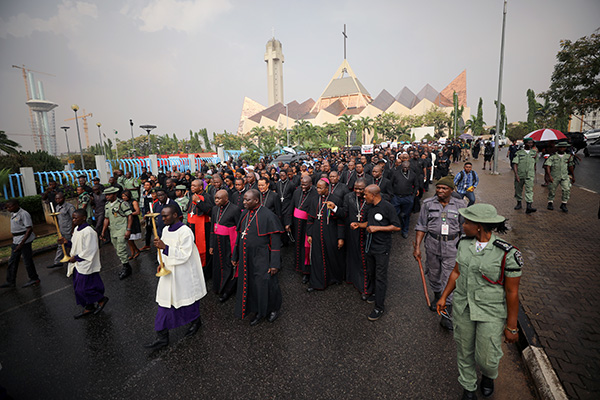
WINDSOR TERRACE — “A land of infidels” is how Boko Haram’s leader described the Kano state of north-central Nigeria. Last year, an Islamic recording artist received a death sentence there for insulting the Prophet Muhammad.
Kano, like 11 other northern states, has adhered to Sharia laws since 1999. That is how the singer Yahaya Sharif-Aminu, 22, was convicted and sentenced for blasphemy. His case is on appeal. Still, Boko Haram’s top general, Abubakar Shekau, assailed Kano in a taped message that appeared in Nigerian media. He said Kano is “not an Islamic state” but a land of infidels “where democracy is practiced.” As for the singer, Shekau said he “should just be killed,” adding, “If you really sentence him, we should only hear that you slaughtered him.”
Ninety percent of people living in the northern states are Islamic, but the other 10 percent, including Christians, also risk Sharia penalties for blasphemy.
“Virtually everything is now blasphemous,” said Father Cosmas Nzeabalu, a priest from Nigeria who serves in the Diocese of Brooklyn. “So, whatever you do that they feel is contrary to the Islamic religion, they take it that you have blasphemed against Muhammad and against God. “And the resultant effect of it is death.”
Father Cosmas recalled how in January of last year, Boko Haram kidnapped the Rev. Lawan Andimi in the Adamawa state of northeastern Nigeria. Andimi was chairman of the Christian Association of Nigeria. According to media reports, his ransom went unpaid, and he refused to renounce his faith. Boko Haram beheaded him.
“Many people have been killed,” Father Cosmas said. “And it has led to the mass exodus of Christians from northern Nigeria to different parts of Nigeria.”
Blasphemy laws are not unique to Nigeria. In December, the U.S. Commission on International Religious Freedom (USCIRF) reported that 84 countries (up from 71 in 2017) now have laws that criminalize insults to religious doctrines. In its report, “Violating Rights: Enforcing the World’s Blasphemy Laws,” the commission looked at 732 cases in 41 countries from 2014-2018. Half of the 84 nations had no recorded blasphemy incidents, suggesting officials in those places were not serious about enforcing the laws; not so in the other countries.
“It is no coincidence that the top six countries with the highest number of blasphemy cases — Pakistan, Iran, Russia, India, Egypt, and Indonesia — are all countries that USCIRF identifies as among the world’s worst violators of religious freedom,” said Gayle Manchin, who chairs the Washington D.C. commission.
The report also examines how blasphemy laws can incite mob violence. Of the 732 cases found, 674 cases involved state enforcement of criminal blasphemy laws. But 78 of those state enforcement cases included “mob activity, threats, and/or violence around blasphemy,” the USCIRF reported.
“The existence of blasphemy laws empowers extremists to take the law into their own hands and employ violence extrajudicially,” said Tony Perkins, vice-chair of USCIRF. “In just one example, we have recently seen a devastating uptick in mob violence related to blasphemy allegations in Pakistan.”
William Shaazad emphatically agreed. He is the chairman of the Brooklyn-based Pakistan Christian Association of USA. “Every single day,” he said, “there is something happening in Karachi, Islamabad, Punjab. It’s getting worse, believe me.” Shaazad said the group is collecting information about the attacks to update the public.
Back in Nigeria, a mob torched the home of Sharif-Aminu, the singer, even before his case went to trial, according to USCIRF.
Such incidents happen despite the nation’s 1999 democratic constitution, which allows freedom of speech and religion. Sister Elizabeth Ogbu — also from Nigeria and assigned to the Diocese of Brooklyn — explained that officials in Nigeria’s northern region “are placing Sharia law higher than federal law, the constitutional law.”
“So, if you are accused of blaspheming, you are violating the law, prosecuted, and maybe sentenced to death,” she added. “But, if we have freedom of speech and religion, that should not be.”
Sister Elizabeth explained Nigeria’s three major groups are the Hausa-Fulani in the north, the Yoruba of the southwest, and the Igbo in the southeast. She said people in the north are mostly Muslim, while Christian religions, including Catholicism, dominate the other two regions.
She also explained that while Sharia laws don’t exist in the southern states, members of the Hausa-Fulani group, including President Muhammadu Buhari, control the federal government. Sister Elizabeth and Father Cosmas have accused federal officials of corruption in their quests for power. Consequently, Sister Elizabeth said, forcing the northern states to respect constitutional freedoms can only happen with new leadership, but that seems elusive.
“In Nigeria, there is nothing like a fair election,” she said. “And for the president and the others, human life means nothing to them any longer. They feel they can do anything to protect Sharia, even to the detriment of life.”
Father Cosmas said, “Blasphemy is a word that has been in religion for so many years. We remember even in the scriptures, Jesus was also accused of blasphemy.”
But, he added, Catholicism offers “a major means of reconciliation with God” to deal with blasphemy and other sins.
“No. 1 is going to confession,” he said. “Then No. 2 is you have to say those prayers of reparation. The priest advises you how to do the prayers or some other actions you have to take in order to reconcile yourself with God again.”
Father Cosmas said the Catholic response to blasphemy reflects a God of justice and forgiveness, not a god seeking Sharia’s death penalty.
“Our concept of God,” he said, “is a God who was able to welcome a prodigal son (Luke 15:11-32) who went against the father’s will but eventually came back and asked for forgiveness.
And with an open embrace, the father welcomed him back. “That is the God we worship.”
